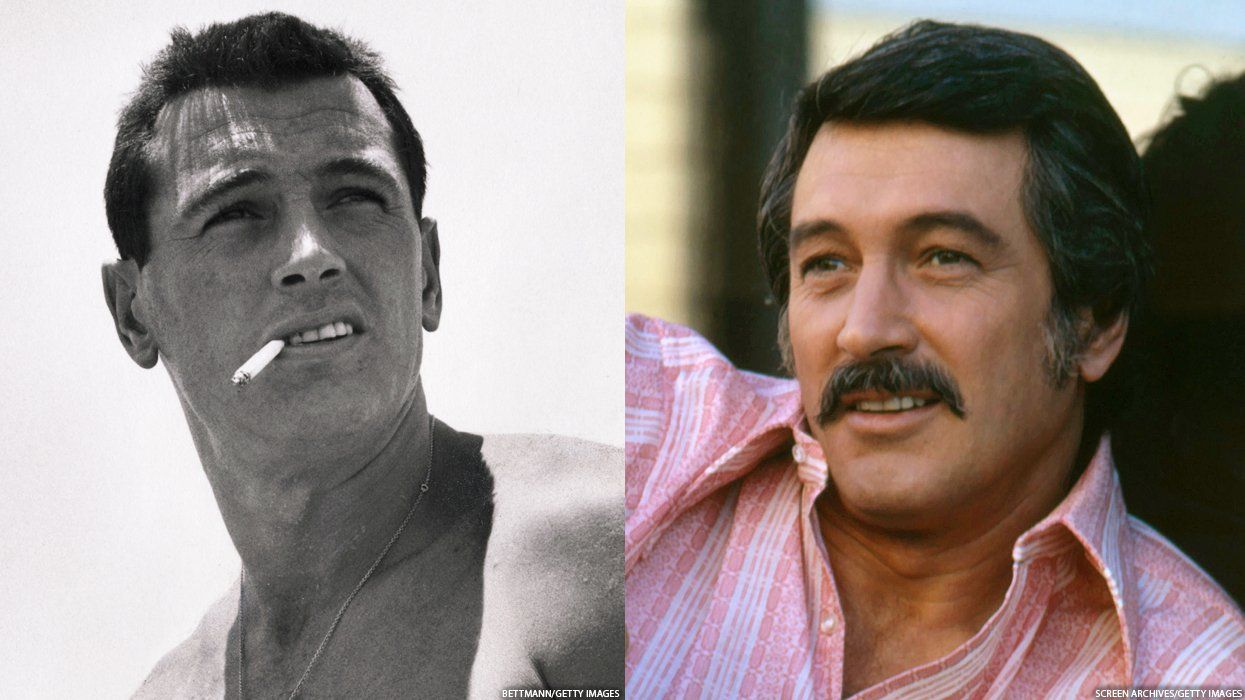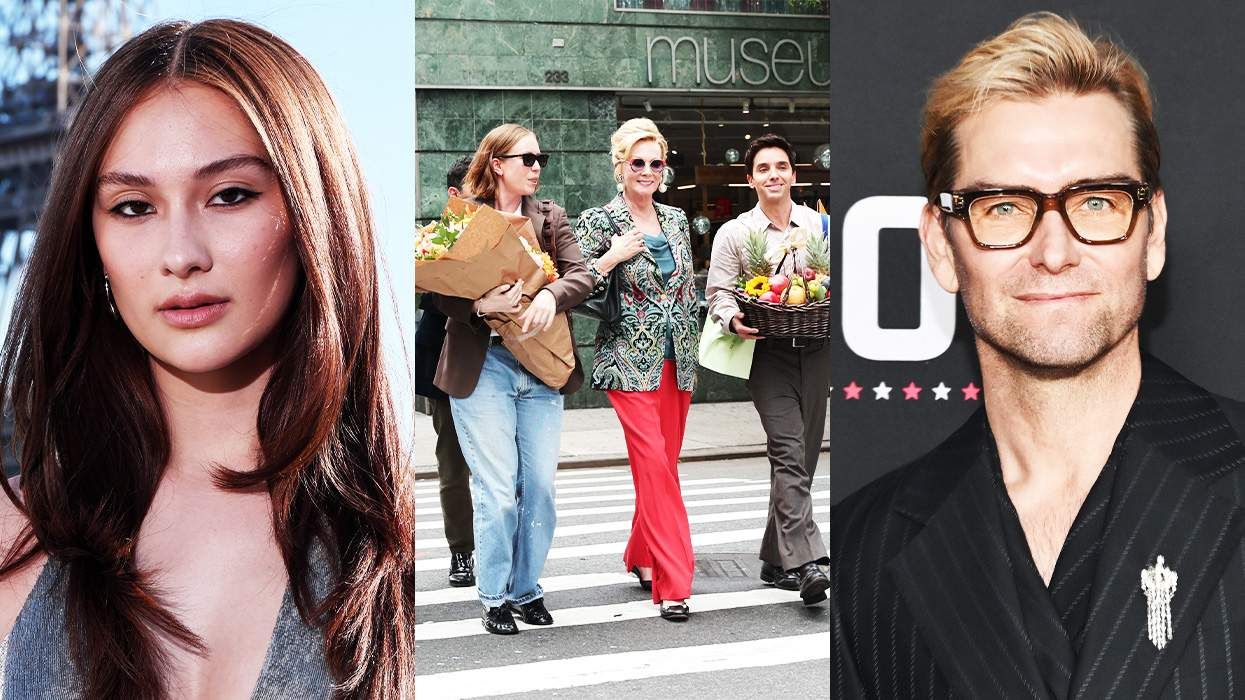Rock Hudson, at first, was Stewart McMillan to me, the police commissioner on the hit NBC series McMillan & Wife in the 1970s. I was just becoming a teenager, so I wasn’t aware that he was one of the biggest stars in Hollywood during the 1950s and '60s.
And Rock Hudson, to my recollection, was the first person I became aware of who was gay — or at least suspected to be gay. It came up as playground talk during seventh or eighth grade, and I vividly recall one of my friends saying that Hudson and Jim Nabors (TV’s Gomer Pyle) were “butt buddies.” How would a seventh-grader know such a thing?
Knowing that I might be different, I couldn’t get that comment out of my head. That went against stereotypes, or at least the little that I did know about being gay. Hudson was “Mac,” a masculine, clever, suave police commissioner. He was handsome too. How could someone like Hudson be a “butt buddy?” It just didn’t add up to my impression that gay men were “light in the loafers,” as my grandfather used to say.
Then, like a ton of bricks, it was confirmed when I watched the CBS Evening News during the summer between my junior and senior years of college. A woman with a French accent spoke outside of a Paris hospital where Hudson was a patient, uttering the words behind the deadly acronym AIDS. Those words still ring in my ear. That was a harrowing announcement for a young man who had just turned 21, and who, like Hudson, had a deep secret. It was all so discomfiting.
I had a hodgepodge of thoughts going through my head. What was his life really like? Who did he sleep with? Who else did he know who might be gay? Did he have a boyfriend? Even the thought of something like that was beyond my comprehension. And then, obviously, I wondered whether he would survive the dreaded disease. And I obsessively tried to figure out how he might have become infected.
In October 1985, Hudson died, and deep down, secretly, I was devastated. I felt like a part of me had died with him. I didn’t know anyone who was gay. Hudson was all I knew. And that he died of AIDS just made it all seem so impossible. How can I ever be gay, like Hudson, and ever survive AIDS if I was gay too?
One of the worst things about that time, after Hudson’s death, was the cruel and inhumane jokes that it spawned. I had to be a party to those jokes, laugh at them, and retell them in order to keep the facade of my heterosexuality. Each time I laughed, each time I retold them, it was like a gut punch. Outwardly, I had to act like Hudson’s death meant absolutely nothing. Inwardly, I mourned in solitude.
I remember that I could not get Rock Hudson out of my head, and when I thought of him, it wasn’t always in a good way.
Yes, Hudson put a public face on AIDS, and his death really did create a new awareness of the disease; however, there was a darker side. if you were in the closet, you didn’t dare come out. To be a gay man meant that you were “like Rock Hudson” and that you would end up the same way he did. That was an unintended consequence. While I grieved for Hudson, I also had some anger toward him.
There were other, far more consequential things that kept me and others like me in the closet, but the easiest reason to grasp was Hudson, because he was so larger than life. Eventually, years later, my anger subsided, I started coming out slowly, in the process looking for ways to find out more about this enigma who gripped my curiosity.
As I got older, I would make a point to watch his films when they’d pop up on TV, including Pillow Talk, Giant, and Magnificent Obsession. I was astonished when in Pillow Talk he feigned being gay to try to woo Doris Day’s Jan. It was just so obvious — at least to me — so why wasn't it obvious to everyone else?
Hudson was a mega-star, created by the Hollywood studios as the epitome of masculinity. I read books and watched television shows, hoping to gain an understanding — and let’s be honest, gossip — about who Hudson was behind that machismo. It was so hard to reconcile. The image of being gay at that time had nothing to do with the representation of Hudson.
At Hudson’s death, there were no out major stars, and there was so little queer representation in film, so we clung to Hudson, even though we knew very little about him. So much of his life was private, so we kept our sex lives private too.
I confess to continuing to educate myself about Hudson since he had such a profound effect on me. That is why I will be anxious to see HBO’s new documentary Rock Hudson: All that Heaven Allowed, which is based on the Hudson biography written by Mark Griffin.
I had the opportunity to speak with the film’s director, Stephen Kijak. And the first thing I asked him was about that privacy. Hudson kept so much of his life hidden, was it tough to put the pieces together and uncover the truth regarding his life?
“We had the great benefit of working with Griffin and his book, so he provided a road map for us that allowed us to talk with some of the people in Hudson’s life, including a former boyfriend, Lee Garlington, as well as playmates and others who knew him personally,” Kijak explained. “We were able to bring him to life through the personal stories of those who are still alive and knew him, and it reveals him in a way that people hadn’t seen before.”
Kijak said that the film ended up providing a new perspective, including the fact that Hudson, like many single men, was sexually active. “One of the things that we uncovered was a secret recording of a telephone call of Hudson talking to a friend, who, for lack of a better term, was a pimp for him and arranged for Hudson to meet willing young men. That was the way it was done back then because discretion was the name of the game, so if you were famous or even just ordinary, you had to go about meeting men in more clandestine ways.”
I mentioned to Kijak that I spoke to music legend Johnny Mathis when he turned 88, and when I asked him if he had ever had a serious relationship, Mathis said no and was rather vague answering that, in effect, he always had friends around he took care of his emotional and physical needs. Since Hudson was from the same generation and also globally famous, did Kijak think that’s an answer Hudson would have given?
“There’s a quote in Sara Davidson’s book [Rock Hudson: His Story] attributed to Hudson, who said that he only loved two people in his life, his mother and Garlington. Hudson tried several times to have relationships, even having some men move into his home.”
Kijak pointed out that toward the end of his life, Hudson tried a relationship with Tom Clark, who was a publicist with MGM and Disney. “He and Clark spent a lot of time together, but Clark was not his type. They were more drinking buddies and sparring partners. The relationship was pretty volatile. He also had a fling and long friendship with writer Armistead Maupin. What’s interesting is that a lot of Hudson’s close friends and those in his social circle were guys in long-term relationships. I think Hudson had a desire to replicate those relationships, but he was never successful.”
“He had his series of tricks, again, lack of a better term, so that sustained him; however, there was one thing we picked up on and that is that Hudson was likely in love with his trainer, who traveled with him everywhere to keep him in shape, but the trainer was straight, so there wasn’t any romance there.”
I had to ask about his time as Stewart McMillan, which is where I fell in love with Hudson. One thing that always intrigued me is that the show was set and partly shot in San Francisco.
Putting Kijak to the test, I asked two disparate questions about Hudson’s TV role. Given its stature as a gay mecca at that time, did Hudson have anything to do with choosing that location? And did Hudson feel it was a step down for him as a global movie star to do a television series?
‘To the first point, no I don’t think he had anything to do with that, but at the same token, I think he was happy about that. Some of the show was shot in L.A., but then the cast and crew would head to San Francisco to do location shots. He enjoyed going there and being out of the glaring Hollywood spotlight. He could be more himself, and hang out with all of the friends and playmates he made in the city. Also, the cast got along so well, so I think it was an all-around great experience for him.“
“Now, to the second part of the question, I don’t think he regretted doing television at all. There were many film stars whose careers were winding down, who tried TV with not much success. Jimmy Stewart comes to mind. McMillan & Wife became a huge hit, and Hudson ended up in everyone’s living room each week, so it really revitalized his career. His film career was flagging, so the television show kept him relevant and wildly popular.”
I don’t think anyone in this generation can really grasp how popular and monumental Hudson really was. I asked Kijak if there was a star or stars today who might be comparable who would help people who didn’t know who Hudson was understand his enormous popularity.
“Wow, good question. I’m trying to think, but I don’t think there was anyone like him before or since. Sure, Cary Grant might have been a precursor, and Tom Cruise maybe, because he’s truly a global star. But when you get right down to it, there was nobody like him. He was a product of his era, built up by the studio system, and that doesn’t exist anymore. There’s just something so towering about Hudson and so romantic about him. He was a dream to so many people. He wasn’t real. He was the biggest movie star, tall, well built, 10 times more handsome than anyone else.”
Then Kijak turned the question around to me. “I’m curious, it sounds like you know a lot about him too, so who would you say might compare to him?”
I told Kijak I'd have to get back to him on that question; however, I don’t think I ever will.
Rock Hudson: All That Heaven Allowed premieres Wednesday at 9 p.m. Eastern on HBO and Max.
John Casey is senior editor at The Advocate.
Views expressed in The Advocate’s opinion articles are those of the writers and do not necessarily represent the views of The Advocate or our parent company, equalpride.
















Charlie Kirk DID say stoning gay people was the 'perfect law' — and these other heinous quotes
These are some of his worst comments about LGBTQ+ people made by Charlie Kirk.